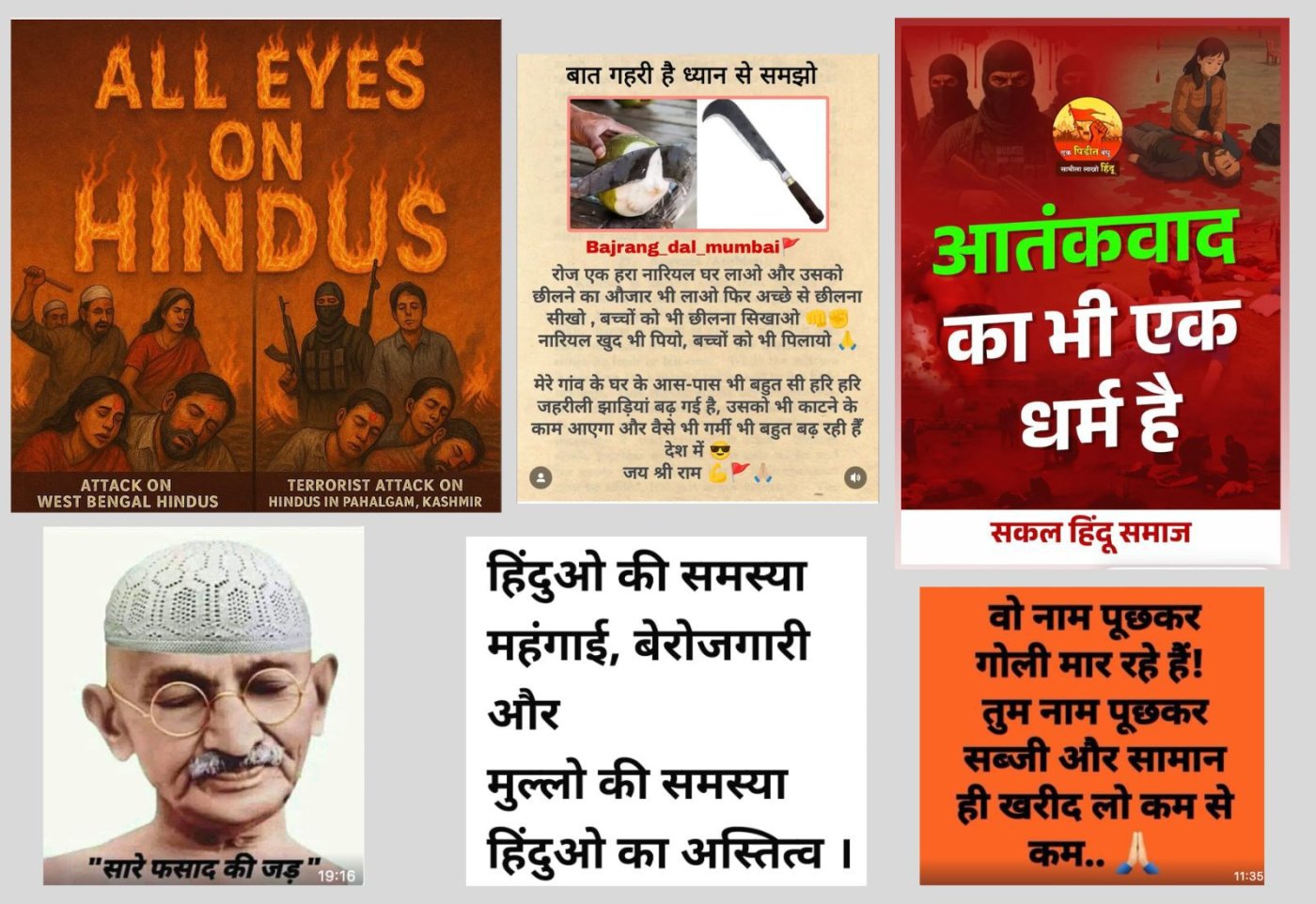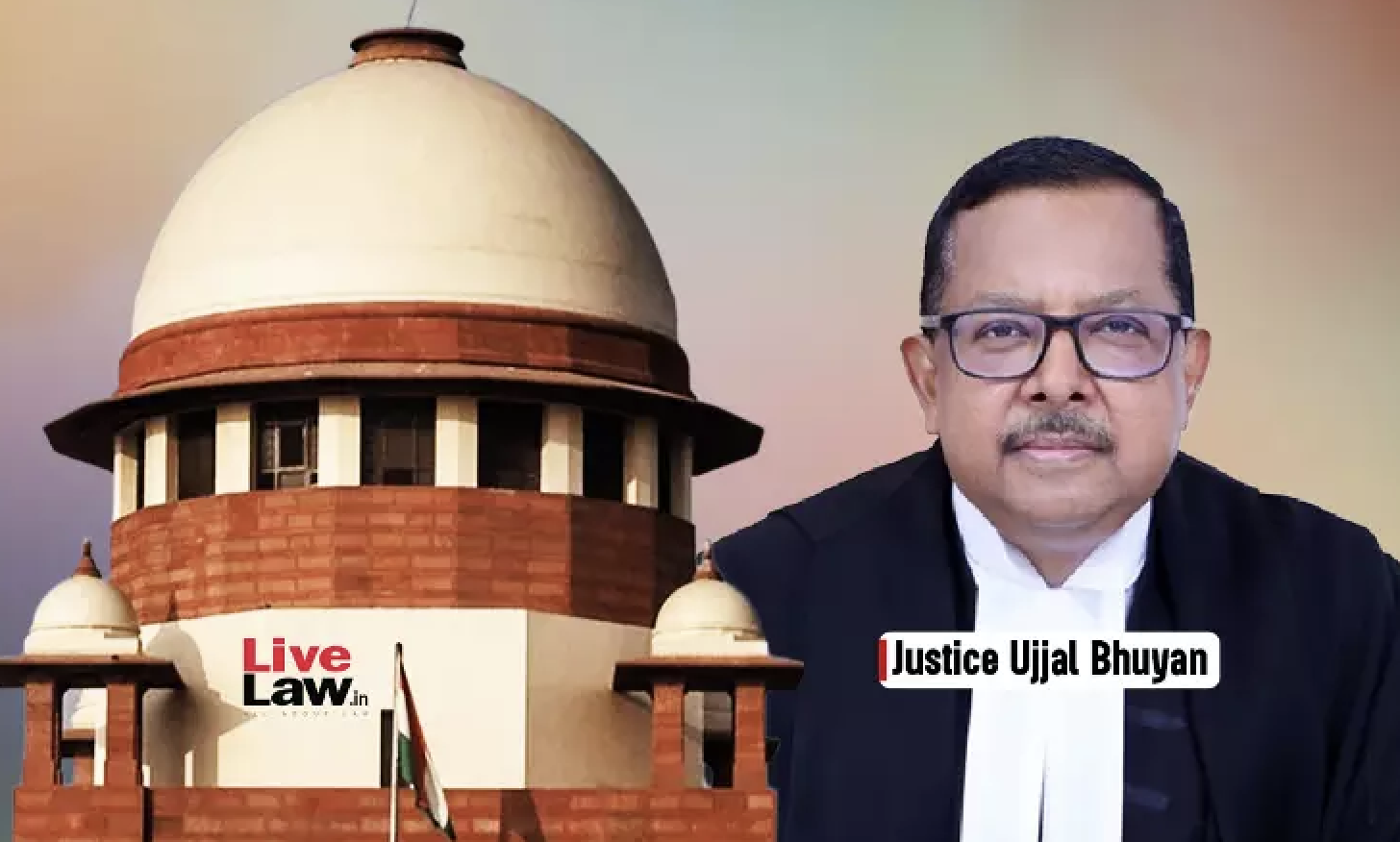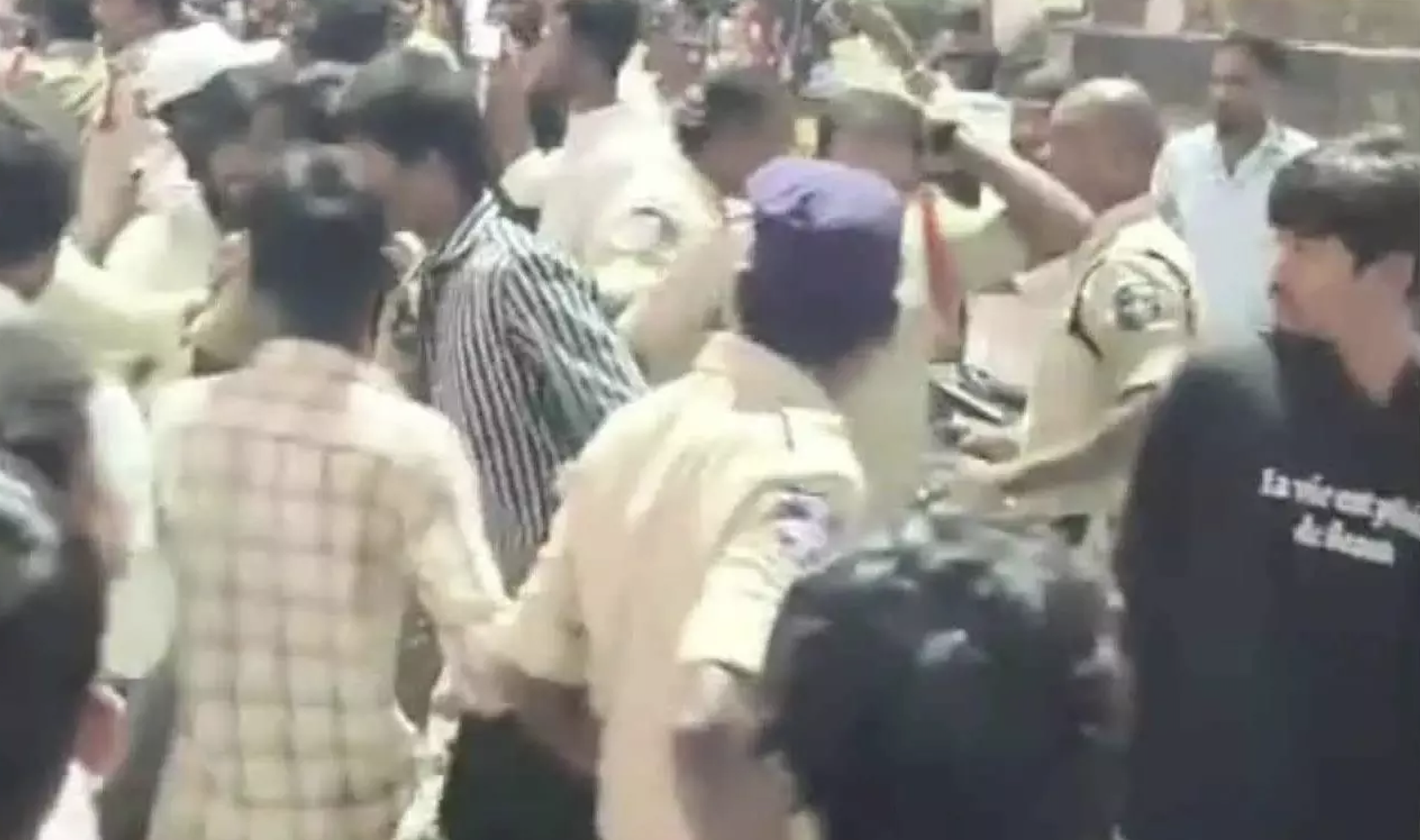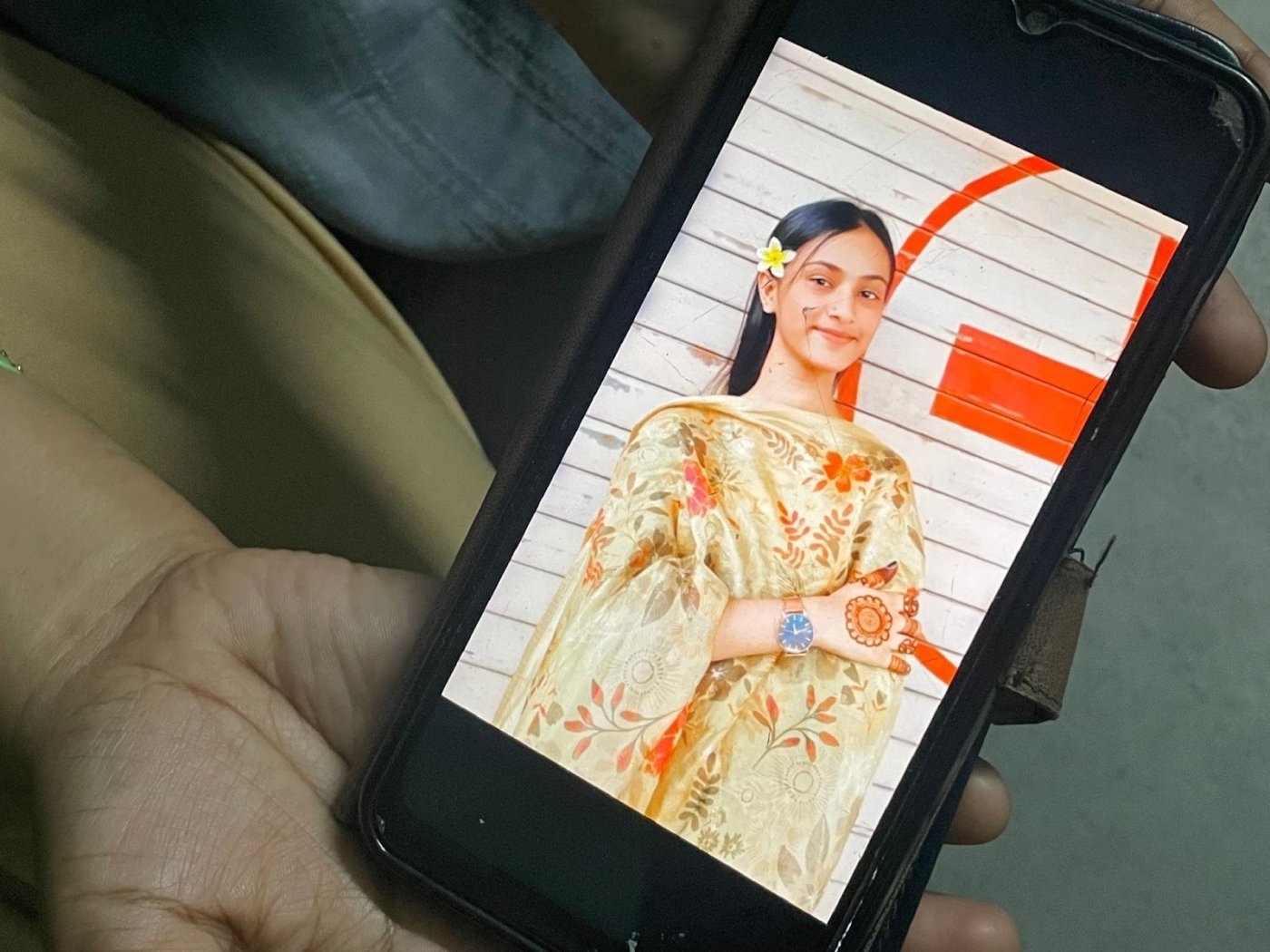
MUMBAI: “What are you looking at? He is a Muslim, beat him up.”
Those were the words that preceded a violent attack on a Mumbai street vendor, Sufiyaan Ali, according to a first information report (FIR) filed by Saurabh Mishra, a Mumbai street vendor at Mumbai’s Dadar police station, who was also attacked along with Ali.
Article 14 has a copy of the FIR.
Mishra alleged that the threat came from mob leader Akshata Tendulkar, the Bharatiya Janata Party (BJP) president of Dadar-Mahim, the Mumbai suburb home to the iconic Shivaji Park.
Tendulkar was leading a protest on 24 April against the terrorist attack in Pahalgam, Kashmir, where gunmen shot dead 26 civilians on 22 April 2025.
For Tendulkar and her mob, clearing Dadar of Muslim street vendors was one way to avenge the terror attack, as she kept repeating that afternoon, as seen in a video she uploaded on her Instagram account on 24 April.
In a few minutes, she and her aides attacked Ali and Mishra.
Videos of the attack later went viral, showing Tendulkar and her aides slapping the street vendors.
Even as India mourned lives lost in the terrorist attack, a coordinated campaign unfolded, offline and online, with one message: that Muslims were a threat to Hindus, that a similar fate awaited all Hindus, and that Muslims needed to be punished through violence and boycotts.

Much of this campaign unfolded through a barrage of social media posts, speeches, recreations of the Pahalgam attack, and artificial intelligence-generated images and videos online.
A Professor Is Arrested
The offensive against Muslims spilled out to the streets and continued beyond the terror attack to the four-day India-Pakistan conflict.
Ali Khan Mahmudabad, head of the political science department at Ashoka University, was arrested after a Facebook post, in which he said that those praising Col Sofiya Qureshi—an army spokesperson during the conflict—should also “equally loudly demand” the protection of “the victims of mob lynchings, arbitrary bulldozing and others who are victims of the BJP’s hate mongering”.
Mahmudabad was arrested on 18 May after two FIRs were registered against him in Haryana’s Sonipat district, including one filed by Haryana State Women’s Commission chairperson Renu Bhatia and another by a BJP Yuva Manch worker.
The charges against Mahmudabad included endangering the sovereignty, unity and integrity of India (section 152), malicious acts intended to outrage feelings (299), promoting enmity between different religious groups (196(1)B), of the Bharatiya Nyaya Sanhita 2023.
Mahmudabad was sent to two-day police custody, and the Supreme Court on 19 May said it would hear a petition challenging the arrest.
Two satirists, Neha Singh Rathore and Madri Karkoti, known as Dr Medusa online, were booked for their social media posts critical of the Modi government, in the aftermath of the Pahalgam terror attack.
Hate speech and intimidation spilt over: Muslim street vendors were attacked and humiliated in Uttarakhand, to terror survivors being trolled, if they refused to succumb to Islamophobia.
The Flood
Article 14 analysed English media news reports from 22 April, when the terror attack occurred, to 13 May, and data sets created by the Washington DC-based India Hate Lab (IHL) and the Center for the Study of Organised Hate (CSOH), which tracks hate speech targeting religious minorities in India.
Through this analysis, Article 14 collated 113 instances of anti-Muslim hate crimes and hate speeches that weaponised the Pahalgam attack, in the three weeks after the incident, which have led to the deaths of two Muslims and injured several others.
These include violence targeted at Muslims on the pretext of the attack, Islamophobic hate speech, as well as threats and intimidation against Muslims, all of them referencing the attack.
Anti-Muslim Hate Incidents After Pahalgam Terror Attack
Article-14 found 113 cases of hate crimes and hate speeches that weaponised the Pahalgam attack to target Indian Muslims between 22 April and 13 May.

The IHL and the CSOH have found 93 instances of anti-Muslim hate crimes and hate speech events across the country during this period.
Article 14 has not been able to independently verify IHL’s videos.
In addition to these, Article 14 found 20 other media reported cases of Muslims being singled out through hate speeches, harassment and violence, including the lynching of an intellectually disabled Muslim man in Mangaluru, Karnataka, on 27 April, after he allegedly chanted Pakistan Zindabad during a local cricket match.
We also studied how the military conflict between India and Pakistan was used to stoke Islamophobic sentiments, finding at least seven incidents of hate speech and violence.
Mobs At Work
On 14 May, the Madhya Pradesh tribal affairs minister and BJP leader Kunwar Vijay Shah called Col Qureshi, the army spokesperson for the Indian government’s conflict briefings, the “sister” of “those who widowed our daughters” in Pahalgam.
Shah later apologised for his remarks.
In four separate instances—two in Maharashtra, one each in Uttar Pradesh and West Bengal—Hindu nationalists assaulted Muslim men for purportedly supporting Pakistan or chanting pro-Pakistan slogans. Article 14 cannot ascertain whether the slogans were chanted.
On 8 May, the morning after India’s military strikes against Pakistan, a Muslim man was assaulted in UP’s Khalilabad for posting a WhatsApp status that allegedly showed Bollywood actors holding the Pakistani flag, with a caption, ‘Pakistan After War’.
On the same day, a Hindutva mob attacked a Muslim man in Maharashtra’s Ratnagiri district, paraded him in public and forced him to chant ‘Bharat Mata ki Jai’, after alleging he posted ‘Pakistan Zindabad’ as his WhatsApp status, in Maharashtra’s Ratnagiri.
A day later, in the Mumbai suburb of Nallasopara, a Hindutva mob vandalised a Muslim man’s shop and attacked him after he allegedly chanted “pro-Pakistan” slogans.
On 12 May, a Muslim man was harassed and forced to do sit-ups and chant ‘Pakistan Murdabad’ by a mob holding tricolours, after he posted a video criticising Prime Minister Modi, in West Bengal’s Cooch Behar.
Links To BJP & Right-Wing Groups
In many cases, the perpetrators have direct links to the ruling BJP, or its affiliate Hindutva outfits (here, here and here).
Ten of these instances saw the direct involvement of BJP leaders.
Maharashtra Ports minister, Nitesh Rane, advocated an economic boycott of Muslims, BJP Delhi leader Devmani Sharma refused to let two Muslim air-conditioner technicians enter his home, Delhi BJP MLA Ravinder Singh Negi alleged that Muslims train their children to be extremists and advocated a boycott of “traitors” within the country for the Pahalgam attack and BJP West Bengal MP Saumitra Khan asked Hindus to sell or rent homes only to other Hindus.
In addition, BJP MLA in Rajasthan, Balmukund Acharya, entered a mosque during a protest against the Pahalgam attack, shouting ‘Jai Shri Ram’ slogans and placing a ‘Pakistan Murdabad’ poster at its gate, Maharashtra BJP MLC Gopichand Padalkar, at a protest meeting around the attack, alleged that “all terrorists were Muslims”, and BJP workers in Maharashtra and Odisha harassed and attacked Muslim street vendors.
Article 14 contacted Anil Baluni, the BJP’s chief spokesperson and media in-charge, over text and email for comments. We will update this story when he responds.
The Vishva Hindu Parishad (VHP), an ideological affiliate of the BJP, was involved in at least 20 of the 113 instances. Leaders from the Bajrang Dal, the VHP’s youth wing, participated in 21 instances.
Govt Silence
On 14 May, the Modi government called the Pahalgam attack “a clear attempt to incite communal violence” in the country. Yet, neither the Modi government nor the ruling party have made any visible attempts to quell its supporters from running this anti-Muslim hate campaign.
According to Christophe Jaffrelot, author and professor of Indian politics and sociology at King’s College in London, such an outpouring of hate after the attack was a result of a “growing anti-Muslim prejudice” in the country.
“The terrorist attacks are attributed to Pakistan-based jihadi groups, but the Indian Muslims are at the receiving hand, not only because they are sometimes seen as fifth columnists, but also (and primarily) because they are scapegoats in the context of a more and more pervasive Islamophobia,” Jaffrelot told Article 14.
“It may show that anti-Muslim prejudice has been normalised, banalised and routinised: this is the order of the day, the only game in town,” he said.
Raqib Hameed Naik, the executive director of the IHL and the CSOH, agreed.
“The Pahalgam incident is being used as a pretext to openly spread anti-Muslim sentiment,” said Naik, adding that this was laying the ground for violence against Muslims.
“In the last few days, the same narratives we observed trending online—framing Muslims as a threat and calling for boycotts—have been mirrored in acts of physical violence and vandalism, particularly.”
Villainising Muslims
Gleaning data from news reports as well as from the documentation of such instances by the IHL, Article 14 has collated at least 113 instances where the terror attack and the ensuing India-Pakistan conflict were used as pretexts to target Indian Muslims.
Of these, 81 were events where incendiary, hateful speeches were delivered offering a range of polarising rhetoric: from asking Hindus to arm themselves and prepare for a war against Muslims to calling Muslims “terrorists” and “green snakes”, asking them to go to Pakistan, and exhorting Hindus to impose a crippling economic boycott against them.
The remaining 32 events showcase the deadly weaponisation of that rhetoric: from physical harassment and intimidation to brutal violence, like assaults and even a lynching.
In Aligarh, three men were arrested after they assaulted a 15-year-old Muslim boy, abused him and forced him to urinate on a Pakistani flag when he was coming back from school on 28 April and picked up a Pakistani flag from the road.
In Haryana and Maharashtra, Muslims saw mass-boycotts: in one of the largest villages of Rohtak, local Hindu villagers reportedly issued a diktat asking Muslim families to leave the village in days, in retaliation for the Pahalgam attack.
Similar scenes unfolded in Maharashtra’s Mulshi, where several villages passed resolutions banning the entry of Muslims from outside their village into the local mosques.
In Maharashtra’s Latur, a road-rage incident on 3 May snowballed into a communally-charged assault, when a journalist asked the Muslim driver, 30-year-old Amir Pathan, if he was “a Pakistani or a Kashmiri” before assaulting him while filming the violence.
The assaulter allegedly threatened to upload the video on the internet, a thought that distressed Pathan so deeply that he took his own life the next evening. Pathan’s wife, Samrin, has now filed an FIR against the assaulter on charges of abetment to suicide and criminal harassment.
Online Hate-Speech Flood
An analysis of social media timelines revealed anti-Muslim messaging around the attack started hours after news of the attack broke out.
Within hours, on the same day, 22 April, pro-BJP handles, some of them known to be followed on ‘X’ by top functionaries including Prime Minister Narendra Modi—some of whom had been invited to government functions like Modi’s oath-taking ceremony—started giving the event a distinct spin.
The account ‘Mr Sinha’, whose list of over 374,000 ‘X’ followers include Modi as well as union minister Piyush Goyal’s office and former union minister Smriti Irani, and who was invited to Modi’s 2024 oath-taking ceremony, uploaded a video from a 2008 Hindi film ‘Shaurya’ where actor Kay Kay Menon, playing an ideologically-biased army brigadier serving in Jammu & Kashmir, is seen referring to Muslims as “a community which is filled with poison”.
Soon after, the messaging veered towards attacking Kashmiri Muslims.
The account uploaded a cropped image from a candle march organised by local Kashmiris to protest the incident with this message: “Muslims participating in candle march against #Pahalgamterroristattack were seen laughing…Do you still believe them? Bloody jihadis..”
Another similar right-wing social media influencer, Rishi Bagree, is followed by PM Modi and union home minister Amit Shah on X. Finance minister Nirmala Sitharaman met him after presenting the 2024 budget, and he was invited to Modi’s oath-taking ceremonies in 2019 and 2024.
Bagree tweeted a video of a Hindu tourist in Kashmir—who praised local Muslims after the attack, said that Hindu tourists did not face any trouble from Kashmiris and asked for harmony between the two faiths—with the caption “Chickens appreciates KFC for their hospitality” (sic), villainising Kashmiri Muslims.
On 25 April, Bagree reposted another tweet that alleged that no Muslim was standing with the government in this crisis and added “Inke khoon mein hi gandagi/gaddari hai (betrayal is in their blood)”.
Lesser-known Hindutva outfits also pushed such Islamophobic rhetoric immediately after the attack.
Sakal Hindu Samaj, a Hindutva outfit that has been instrumental in organising public rallies on Hindu nationalist causes in Maharashtra and has routinely seen speakers deliver hate speeches from its platforms, posted a story on its Instagram page with similar messaging—it called the terror attack “a religious war” to “finish off Hindu religion in India” and said an economic boycott of Muslims was the first battle that Hindus needed to fight, in response to the attack.
At the same time, YouTube saw a rush of Hindutva pop music (H-Pop), typically songs that echo Hindu nationalist ideology, being released, reiterating the same message: Hindus must treat the terror attack as a wake-up call and treat Muslims around them as threats, if they don’t want to meet the same fate.
For instance, the song titled ‘Pahalgam Mein Hamla’ by singer Sanjo Baghel, released on 24 April, two days after the terror attack, insists that Hindus will now have to be alert at all times because the terrorists were “enemies of Hindus” and they “hate Hindus”, rather than classifying this as a national security concern.
The song titled “Pehle Dharam Pocha”(They Asked About Religion First), by singer Kavi Singh, is aimed at Indian Muslims, accusing them of plotting against Hindus and calling for them to leave the country.
The song has been viewed over 1.05 million times and has over 12,000 likes.
Similarly, another song by singer Lavkush Singh, ‘Hindu Ko Bachalo, Hindutva Ko Bachalo’ (Save Hindus, Save Hindutva), with over 3,000 views, insists that the way to avenge the terror attack was to “throw out all the traitors sitting in India”, referring to Muslims without naming them.
But as this online hate swirled, some of it started spilling onto the streets and had deadly ramifications.
Offline Too
Almost immediately after the attack, Kashmiri Muslims across the country started facing threats and intimidation.
According to the India Hate Lab’s documentation of hate speech events after 22 April, speakers at at least 64 such events “routinely used dehumanising language”, referring to Muslims as “green snakes”, “piglets”, “keede” (insects), and “mad dogs”.
The report added that such events also contained direct calls to violence against Muslims.
A far-right Hindu monk, Madhuram Sharan Shiva, called for violence against Muslims in an event in Jhansi, Uttar Pradesh, asking Hindus to arm themselves with weapons.
“You have to finish these adharmis (treacherous, impious),” he said, according to the IHL report.
On 23 April, in Prayagraj, Uttar Pradesh, Kashmiris were asked to evacuate their rental homes by landlords fearing an imminent attack on them. The Prayagraj police have dismissed these claims, calling them rumours.
Kashmiri Muslim students also fled from Dehradun after receiving threats from a local Hindutva outfit, Hindu Raksha Dal, which put out a video threatening them with dire consequences.
“Kashmiri Muslims, you have time till 10 tomorrow. Run away,” said Lalit Sharma, a member of the organisation, while waving his finger menacingly at the camera. “Or else you will face terrible consequences.”
In Mumbai, the country’s financial capital, such hate was on display multiple times.
In Santacruz, a rally held by Hindu right-wing outfits on 26 April descended into violence between Hindus and Muslims.
The argument began after locals objected to a religious flag being pasted on the road along with flags of Pakistan and Bangladesh. Later that night, CCTV footage captured Hindu men vandalising shops and homes of Muslims in the area.
In Vile Parle, a group of men heckled a Muslim woman, who objected to a Pakistani flag being pasted at the entrance to the railway station, and called her “desh ke gaddaar” (traitors of the country).
“Aap Pakistan ke ho kya? (Are you from Pakistan?)” a male voice asks her in the viral video of the incident, “Toh fir udhar hi jao na (Then go there).”
‘We Don’t Want A Single Muslim’
Two days after the terror attack, on 24 April, BJP’s Tendulkar, along with her aides, was walking through the famous markets of Mumbai’s Dadar suburb, urging local hawkers not to employ Muslims.
In a 13-minute-long video she uploaded on Instagram, Tendulkar was seen talking to locals.
“Udhar Kashmir mein chhoda kya apne logo ko? Murshidabad mein chhoda? (Did they forgive our people in Kashmir? Or in Murshidabad?)” she asked a street vendor who was arguing with her.
“Amhala ek hi Mussalman nako aahe (We don’t want a single Muslim here),” she is seen telling another street vendor.

She is seen complaining to someone out of shot that “there was not a single Hindu there…they were all Muslims”, referring to the vendors.
That is when they stumbled upon Sufiyaan Ali, the Dadar street vendor, who was standing at his usual spot outside Dadar station, and assaulted him as well as Saurabh Mishra, Ali’s employer.
“Don’t you understand that you are supporting Muslims? Do you not have any sense?” Tendulkar asked Mishra, according to the FIR, which he later filed with the Dadar police station.
Tendulkar and her aides attacked Mishra, according to the FIR.
Some of the BJP workers, then, took Ali into a small bylane, and attacked him again, Mishra said, speaking to BBC Marathi.
They left within a few minutes, after warning Mishra, according to the FIR, that he would not be spared if he employed a Muslim again.
(Kunal Purohit is an independent journalist and the author of the book ‘H-Pop: The Secretive World of Hindutva Popstars’.)
This story was originally published in article-14.com. Read the full story here.






